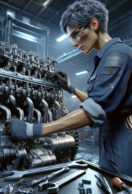Understanding Diesel Engine Knocking Sounds
Diesel engine noise can be a significant concern for vehicle owners, with abnormal sounds often indicating potential problems. One of the most common issues is engine knocking, characterized by a distinctive repetitive tapping or pounding sound. This knocking can stem from various causes, including fuel injection timing issues, worn bearings, or problems with the pistons and cylinder walls. Other factors contributing to diesel engine knocking may involve low-quality fuel, incorrect fuel grade, or carbon buildup in the combustion chamber. It's crucial to address these abnormal engine sounds promptly, as they can be early warning signs of more severe engine problems. Ignoring diesel engine knocking may lead to increased wear on engine components, reduced fuel efficiency, and potentially catastrophic engine failure if left unchecked. Regular maintenance, using high-quality fuel, and addressing unusual noises quickly can help prevent many diesel engine problems and ensure optimal performance and longevity of the vehicle.
Common Causes of Knocking Sounds in Diesel Engines
Engine performance issues can stem from various sources, with fuel injector problems, piston slap, worn bearings, timing problems, low-quality fuel, and carbon buildup being common culprits. Fuel injector issues can lead to uneven fuel distribution, causing misfires and reduced efficiency. Piston slap occurs when there's excessive clearance between the piston and cylinder wall, resulting in a distinctive knocking sound. Worn bearings can cause increased friction and potential engine damage if left unaddressed. Timing problems, whether related to the timing belt, chain, or electronic systems, can significantly impact engine performance and fuel economy. The use of low-quality fuel can lead to deposits and reduced engine efficiency over time. Carbon buildup, particularly in direct injection engines, can obstruct fuel injectors and valves, leading to decreased performance and increased emissions. Regular maintenance, including using quality fuel and adhering to recommended service intervals, can help prevent or mitigate many of these issues, ensuring optimal engine performance and longevity.
The Impact of Ignoring Diesel Engine Knocking
Engine damage can have significant consequences for a vehicle's overall performance and longevity. When an engine sustains damage, it often leads to reduced performance, causing the vehicle to lose power, acceleration, and efficiency. This decline in performance is frequently accompanied by increased fuel consumption, as the damaged engine struggles to operate optimally, requiring more fuel to produce the same output. The combination of reduced performance and higher fuel consumption not only affects the driving experience but also impacts the vehicle owner's wallet. If left unaddressed, engine damage can escalate, leading to costly repairs that may involve replacing major components or even the entire engine. In severe cases, continued operation of a damaged engine can result in complete engine failure, rendering the vehicle inoperable and potentially leaving the driver stranded. Regular maintenance and prompt attention to any signs of engine trouble are crucial in preventing these issues and ensuring the longevity and reliability of a vehicle's engine.
Preventive Maintenance to Avoid Diesel Engine Knocking
Regular vehicle maintenance is crucial for ensuring optimal performance and longevity of your car. Regular oil changes are essential, as they lubricate engine components, reduce friction, and remove harmful contaminants. Fuel system maintenance, including cleaning injectors and replacing fuel filters, helps maintain engine efficiency and prevents fuel-related issues. Timely belt replacements, particularly for timing and serpentine belts, are critical to avoid sudden breakdowns and potential engine damage. Proper warm-up procedures allow engine oil to circulate and components to reach optimal operating temperatures, reducing wear and tear. Using quality fuel with the appropriate octane rating for your vehicle helps maintain engine cleanliness and performance. These maintenance practices, when performed consistently, contribute to improved fuel economy, reduced emissions, and extended vehicle lifespan, ultimately saving drivers money on repairs and replacements in the long run.
At All in the Wrist Diesel and Auto Repair in Albuquerque, we can see to all of your automotive needs, including potential problems with your diesel engine. Contact us, we can help!




